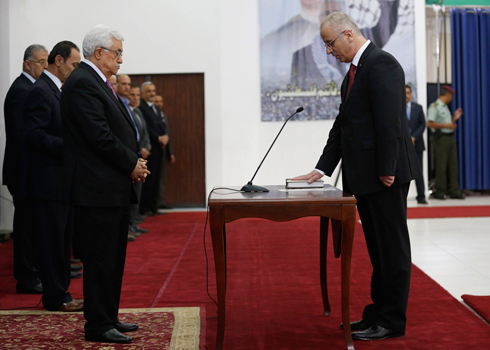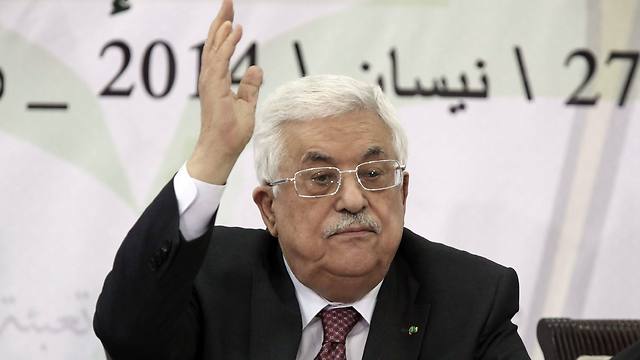Israeli leaders are worried, and rightly so, about the creation of the Palestinian unity government that was sworn into office on Monday in Ramallah, and about the reconciliation process between Hamas and Fatah that appears to be gaining momentum.
However, alongside the drawbacks that are worrying officials, there are also benefits from the Israeli point of view - enough that Jerusalem needs to choose their stance cautiously instead of immediately being drawn into a sweeping denial of the entire process.
Officials will have to act quietly and behind the scenes to minimize the drawbacks and extract the benefits.
Related Stories
- Palestinian unity government sworn in at Ramallah ceremony
- Unity agreement makes Abbas directly responsible for terror from Gaza, says Netanyahu
Abbas, Kerry speak ahead of Palestinian unity government formation
After the swearing in of the reconciliation government, Israeli leaders have a clear interest not only to lower their profile in media statements, but also not to release sanctions on the Palestinian Authority.
Economic and monetary sanctions on the PA will lead to unrest in the West Bank; the US will stop aid to the PA and Israel will stop the tax refund payments.
That's the reason that the government will continue with security cooperation, and that's even the reason that all the sanctions that the cabinet announced when the Palestinians decided to pursue unity, won't be put in action.
The Israeli government didn't stop the money from flowing to the PA and no other action was taken that would lead to unrest and threaten the relatively calm security situation which Israel of course, would like to see continue. So sharp announcements and sharp actions are two different things.
Drawback of Legitimate Terror
The main drawback of the reconciliation government is in the security arena. Abu Mazen and his security administration aren't acting as they did in the past against Hamas actions in Gaza. Most importantly, they won't act with zero tolerance toward sprouting cells of terrorism carried out on orders or with permission of Hamas.
In fact, even today the PA security apparatus isn't acting in full force against Hamas actions as they did in the past. As a result of this, the Shin Bet and the IDF need to do most of the prevention work themselves, attested to by rising numbers of suspicious suspects taken into custody by Israel.
In this situation, the possibility of a fire erupting in the West Bank from protests, or an arrest gone wrong, is growing. The hunger strike of Palestinian prisoners in Israel also can't be forgotten for its explosive potential.
A second reason to be concerned in the short run is that Hamas, which is on rocks economically and politically today, will receive not only legitimization through Abu Mazen and his people, but also the financial oxygen it needs to continue breathing.
The agreement will make it possible for the movement to continue to govern in Gaza while expanding its support in the West Bank.
That brings us to the third threat that could be faced in the near future: the creation of a situation in Gaza and the West Bank similar to that in Lebanon.
This means an accepted and respectable cloak in the international arena for Abbas, the PLO, and the free actions of a terrorist group determined to destroy Israel.
If there will be a flare in tensions as a result of rockets fired from Gaza, Abu Mazen will have to give support to Hamas and use his prestige in the international arena, especially in Europe and Arab countries, in order to prevent Israeli retaliation.
A very democratic coup
In the long term, the dangers of reconciliation are clear. Hamas, united and resolute in ideology, will slowly conquer the West Bank through the democratic process, which Israel will find hard to oppose, even as the group is feted by the US and European Union.
Hamas' seizure of control in the West Bank through democratic means, as well as a takeover of the Palestinian organization that the United Nations recognizes - the PLO – will permit the group to achieve its long-term goals, namely, an armed struggle against Israel, thereby ending any chance of a negotiated political settlement.
One must take into account the fact that Abbas is almost 80 and liable to exit the stage at any minute. Neither Fatah nor the Palestinian Authority has even one other leader who comes close to Abbas' charisma and authority and who could enforce his political position. Not even Marwan Barghouti, sitting in an Israeli jail for multiple murders, could fill Abu Mazen's shoes.
Abbas and Gaza
The benefits of establishing a Palestinian reconciliation government are not inconsiderable. Primarily, it is a lifeline for a troubled Hamas, which is not necessarily a bad thing, in particular when one considers the alternatives - Islamic Jihad, the Popular Resistance Committees and the Salafist groups operating in Gaza.
Furthermore, the reconciliation agreement lends new legitimacy not only Hamas, but also to Mahmoud Abbas and his camp.
Until now, the opponents of Abbas and of his position of talking to Israel and coordinating security claimed that the president had no political legitimacy. They argued that his legal period of rule had long expired, given the absence of elections, and that he did not represent the Gaza Strip.
Now he has reclaimed that legitimacy, and Israel and the international community can, justifiably, demand that he be held accountable for events in the Gaza Strip.
Mahmoud Abbas will now have to explain each time there is rocket fire from any source anywhere in Gaza. He could be another means of enforcing the Egypt-brokered security agreements reached between Israel and Hamas after the IDF's November 2012 operation, Pillar of Defense.
These are considerable advantages that Israel should consider. It is absolutely clear that resistance groups in Gaza will try to sabotage the reconciliation agreement, in particular if it yields long-term calm between Gaza and the Western Negev. Hamas will have to make an effort to enforce its authority, or the reconciliation government will disintegrate.
The next hurdle is that the Palestinians are heading for presidential elections next year. The success of the reconciliation government and Abu Mazen's ability to force its members into tacit acceptance of a political position that recognizes Israel, along with preventing violence and abiding by previous agreements with Israel , will determine how the international community relates to the new government and the upcoming presidential elections.
As such, Israel should tone down the belligerent pronouncements opposing the reconciliation, which only harm itself in the international and Arab spheres. Israel must act wisely but quietly to ensure that Abbas does not end up being a puppet in the hands of Ismail Haniyeh and his camp. It can be done; Israel has the tools to do it, provided those who do so do not blabber their way to exposure.



















